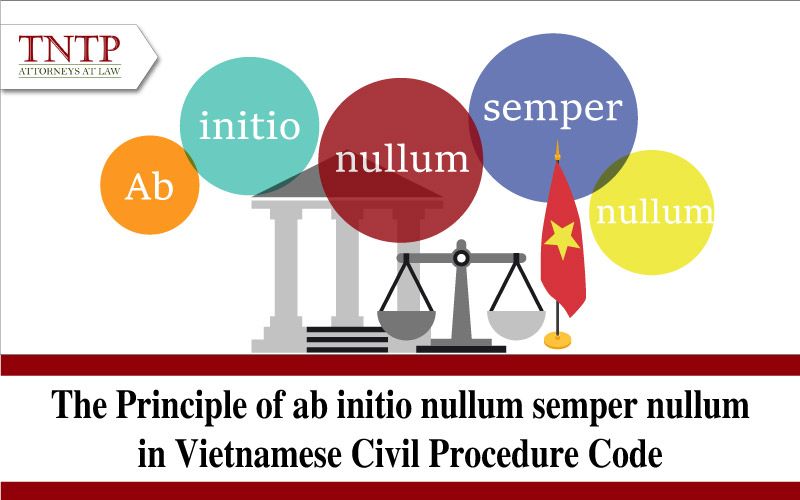The Principle of ab initio nullum semper nullum in Vietnamese Civil Law

Latin is widely used in many legal systems worldwide due to historical and political factors and its precision in defining legal concepts. In Vietnam, many Latin terms have also been incorporated into legal provisions in various legal documents. In this article, TNTP will analyze the principle of ab initio nullum semper nullum and its application in Vietnamese civil law regarding the validity and invalidity of civil transactions.
1. What is the Principle of Ab Initio Nullum Semper Nullum?
In Latin, ab initio nullum semper nullum means “null from the beginning, forever null”. This is a principle applies in civil transaction. It establishes that when an action, agreement, or contract fails to satisfy the requisite conditions for validity at its inception, it shall be void from the beginning of the transaction and considered as “non-existent” .
The principle of ab initio nullum semper nullum serves to ensure conditions for a valid legal transaction are met from the beginning to be recognized. Moreover, the principle aims to protect the law and limit transactions that contravene legal regulations or social ethics. This principle is also used to protect the parties involved in a transaction where the condition for a valid transaction is not met at the beginning.
2. The principle of Ab Initio Nullum Semper Nullum in Vietnamese Law
Vietnamese law has incorporated the spirit of the ab initio nullum semper nullum principle in several legal provisions to declare a transaction voided, specifically:
• Not meeting the requirement for a valid transaction
Article 117 of the 2015 Civil Code establishes conditions for legal validity of transactions and contracts, namely: (i) The parties have legal personality and/or legal capacity appropriate to the established civil transaction; The parties voluntarily enter into the civil transaction; The purpose and content of the civil transaction do not violate prohibitions of the law or contravene social ethics; (iv) Meet form requirements if the law ordered so. If one of these conditions does not meet when establish a transaction, it could be nulled and voided.
• Violates prohibitions of the law or contravenes social ethic
Article 123 of the 2015 Civil Code states that a civil transaction is null and void if it violates prohibitions of the law or contravenes social ethics.
Legal prohibitions are rules that forbid specific actions. Social ethics are behavioral standards commonly accepted and respected within a community. This regulation ensures that civil transactions comply with both legal requirements regarding parties involved and society’s ethical norms.
• Simulated transaction
A simulated transaction is one conducted to conceal another civil transaction. Under Article 124 of the Civil Code 2015, when parties establish a simulated civil transaction to hide another civil transaction, the simulated transaction becomes void while the concealed transaction remains valid. If a simulated civil transaction is created to evade obligations to a third party, that transaction shall be void.
This regulation ensures truthfulness in transaction content by preventing civil transactions from being executed to conceal their true purpose – actions that could affect the rights of both participating parties and other legally protected entities.
• Transaction established and performed by individuals who are minors, lack civil act capacity, experience cognitive or behavioral control difficulties, or possess restricted civil act capacity
Article 125 of the 2015 Civil Code stipulates that civil transactions are null and void when executed by individuals who are minors, lack civil act capacity, experience cognitive or behavioral control difficulties, or possess restricted civil act capacity. This regulation mandates that parties undertaking transactions must possess adequate cognitive capacity to comprehend their actions. Legal representatives or guardians are required to establish transactions on behalf of these vulnerable groups to ensure legal validity, as transactions conducted independently by such individuals cannot be legally recognized.
• Misunderstanding
Article 126 of the 2015 Civil Code states that if a misunderstanding in a civil transaction causes one or more parties to fail to meet the objectives of establishing the transaction, the mistaken party has the right to request a court to declare the transaction invalid.
• Deception, threat, or compulsion
Article 127 of the 2015 Civil Code states that a civil transaction is null and void if it is entered into under deception, threat, or compulsion. Any party who enters into a civil transaction due to deception, threats, or coercion has the right to request that a court declare the transaction invalid.
• Lacking cognition or control over their actions
Article 128 of the 2015 Civil Code states that a civil transaction is null and void if the person establishing it lacks in cognition or control over their actions.
• Does not comply with formal requirements
Article 129 of the 2015 Civil Code states that a civil transaction is null and void if it does not comply with formal requirements. Certain transactions must comply with formal requirements for legal validity. High-value real estate transactions, for instance, must follow strict formal requirements since transaction details are difficult for individuals to verify. Ensuring formal compliance is necessary to protect the rights of the parties involved.
• Legal consequence of voided transaction
Clause 1, Article 131 of the 2015 Civil Code stipulates that a voided civil transaction does not establish, change or terminate the civil rights and obligations of the parties from the time the transaction is established. This consequence accurately reflects the principle, since if a civil transaction does not meet the conditions for a valid transaction, it will be invalid and no rights and obligations of the parties will be occurred from the time it is established.
It can be seen that Vietnamese law has recognized the Principle of Ab initio nullum semper nullum in the provisions related to determining invalid civil transactions and the legal consequences of invalid civil transactions.
The above article discusses the principle of Ab Initio Nullum Semper Nullum in Vietnamese Civil Law. We hope this article provides valuable insights for readers.
Best regards,



